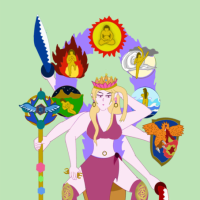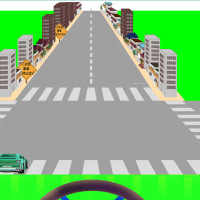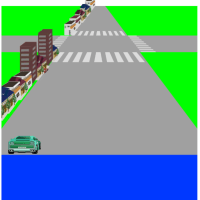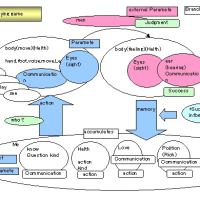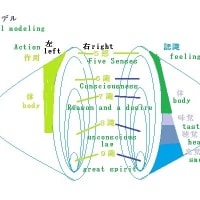Ⅲ.価値のルール。Ⅲ. Value rule.
1) There are individual differences in value, but consider universal value.
Universal value is called "good(Zen)", public justice, and good justice.
It is gradually divided into natural justice, social justice and personal justice.
It is criterion value usually .
The act of justice is to protect and contribute.
Protect nature. Protecting society. Protect individuals.
These values are equivalent.
What is the true intention of protection? .. To take care. Create. Do not destroy.
"Protecting nature" means protecting the lives of living creatures of passionate (with emotions) and those of ruthless (without emotions).
The value of compassionate life is equal. Value is high in compassion and low in ruthless.
The value of compassionate life is equal. The value of affection is higher than that of ruthlessness.
What is the standard of value is called "value standard".
There is "goodness(Zen), reason, beauty" in the value standard. What does it mean?
"Good(Zen)" is "natural". "Theory(Ri)" is "society". "Beauty(Bi)" is "individual".
That can be rephrased.
1)価値には個人差があるが、普遍的な価値を考える。
普遍的な価値を「善(ぜん)」、公の正義、良い正義と呼ぶ。
それは、段階的に自然的な正義、社会的な正義、個人的な正義に分かれる。
それは、通常、価値の基準となるものである。
正義の行動とは、守ること、貢献することです。
自然を守る。社会を守る。個人を守る。
これらの価値は同等である。
守るの真意とは何か?。大事にする。創造する。破壊しない。
「自然を守る」とは、有情の生き物の命、非情のものを守る。
有情の命の価値は、同等である。価値は、有情が高く、非情は低い。
価値の基準となるものを「価値基準」と言う。
価値基準に「善、理、美」がある。それが持つ意味とは。
「善」とは、「自然」である。「理」とは、「社会」である。「美」とは、「個人」である。
そうと言いかえれる。
2) The criterion value seen from the view of religion.
There are "goodness(Zen), love(Ai), desire(Yoku) and evil(Aku)" in the criterion value.
(1) "Goodness" is the standard of altruistic behavior that is explained in the Buddhist law.
(2) “Love” are the self-esteem ,other-esteemlove taught in Christianity.
(3) "Lust" refers to the desire that humans originally have.
(4) “Evil” is not something to say that it is okay to go. Evil should be an independent value standard in judging value.
In other words, the standard items that generate value are “goodness, love, and desire”.
The value standard is "eliminate evil" rather than "justice".
This is the relationship between the value gained (value obtained) and the price paid (value paid).
The former is "good(Zen)" and the latter is "evil(Aku)".
2)宗教観から見る価値的基準。
価値基準に「善・愛・欲・悪」がある。
(1)「善」とは仏様の法で説く利他的行動の基準である。
(2)「愛」とはキリスト教で説く自他的愛です。
(3)「欲」は人間に本来そなわっている欲望を示します。
(4)「悪」は行って良いかと言うものではなく、悪は悪で価値を判断する上で独立した価値基準を取るべきである。
つまり、価値の発生する基準となる項目は「善・愛・欲望」に成ります。
価値の評価の基準は「悪」に成ります。
価値基準は「正義」ではなく「悪を排する」となります。
これは、価値の得価(得る価値)と代価(払う価値)の関係です。
前者は善、後者は悪です。
3) There is "theory" as a means to build value.
・Law (judiciary, administration, legislation).
・Social system (economy, management, activities).
・Organization/Labor
·etc
Theories (systems) consist of complex means of realizing the values of a country, society, company or individual.
3)価値を実現するシステムとして、「理」があります。
・律法(司法、行政、立法)。
・社会システム(経済、経営、活動)。
・組織・労働
・等
理論(システム)は、複雑な、国、社会、会社、個人の価値を実現するための手段で構成されます。
4) And in order to create value, we have to pay for resources, money, health, nature, and life (time).
Actually, I can write "people, goods, money", but more specifically, people are health, life, time, things are resources, nature, information, distribution, processing, products, and gold is money (interest )It was made.
4)そして、価値を生むためには、資源、金、健康、自然、命(時間)と言う代価を払わなければならない。
本当は「人・物・金」と書けるのですが、より具体的に、人を健康、命、時間、物は、資源、自然、情報、流通、加工、製品とし、金は金(利害)としました。
5) Each value standard has its own flow from others.
(1) “Good(Zen)” (action: work, life, role (responsibility))
Nature protection → Human life protection → Social mission (social activities)=Artistic activity → Life activities
・The closer to nature, the higher the value.“=” is equivalent.
(2) Love (action: work, life)
Nature love → Humanity love → Country → Region → Friends → Family love
・The closer you are to yourself, the higher the value. For others, the farther away from me, the higher the value.
(3) Desire (action: work, life)
① Realization of other desires (wishes of others) (guide, support, goodwill (volunteer))
↓
② Appreciation: Beauty (beautiful shape, music, art, taste)
↓
③ Satisfaction of self (knowledge, speech, execution, realization, food) Happiness
↓
④ Privacy (self protection, leisure)
・Values of ①②③④ are equivalent.
Rule (Happiness is also self-centered, but it is consistent with society and with the world (nature).)
5)価値基準には、それぞれ他から自へ流れがあります。
(1)善(行動:仕事、生活、役割(責務))
自然保護→人命保護→社会的使命(社会活動)=芸術活動→生活活動
・価値は自然に近いほど高くなる。「=」は等価値。
(2)愛(行動:仕事、生活)
自然愛→人類愛→国→地域→友人→家族愛
・価値は、自分に近いほど高くなる。他の人にとっては、遠いほど高くなる。
(3)欲望(行動:仕事、生活)
①他欲(他社の願い)の実現(導き、支え、善意(ボランティア))
↓
②鑑賞:美(美しい形、音楽、芸術、味)
↓
③自己の満足(知識、発言、実行、実現、食)幸福感
↓
④プライバシー(自己の保護、余暇)
・①②③④の価値は同等である。
ルール(幸福感についても自分中心であるが社会と一致してあり、世界(自然)と一致してある。)
6) Evil is an evaluation of price. "Person (animal/plant)> thing> gold". I will write in more detail below.
"Life, health, time" → "Nature (plants, food), information, resources, distribution, processing, products" → "Gold (interest)"
I can't say this unequivocally, but I make this decision.
Note 1) There are costs and profits.
Note 2) Interest means obtaining power and profit. Or lose.
6)悪とは、代価の評価である。「人(動物・植物)>物>金」。以降にもっと詳細に書く。
「命、健康、時間」→「自然(植物、食べ物)、情報、資源、流通、加工、製品」→「金(利害)」
これも一概には言えないが、こう決定する。
注1)代価と得価がある。
注2)利害とは、権力、利益を得る。または、喪失する。
7) The heart is the expression of action. It becomes a source of value.
(1) The value of Buddha's heart. Creating the value of "good". Love for all.
・Love to all is to love many and is a great good. Great goodness is to contribute to nature, society, and individuals.
・Ten good events. As follows.
Thing that should not be done.
kill. stolen. Dishonest love. Delusion. Strange act.Abuse. contradiction.Avarice.Anger.The grumble.
(2) The value of God's heart. Creating the value of "love". Love for others.
・Love for others is altruistic love that supports and guides others.
(3) The value of the Devil king's heart. Creating the value of "desire".
-Elimination of evil heart (selfishness). Happiness.
(4) The actions we love are as follows.
・Do something that pleases the person. (Creates value for the person.) Is it good?
7)心は、行動の発露です。それは、価値を生み出す源に成る。
(1)仏様の心の価値。「善」の価値を生むこと。全てへの愛。
・全てへの愛とは、多くを愛していくことであり、大いなる善である。大いなる善とは、自然貢献、社会貢献、個人貢献です。
・十善戒。
してはいけないこと。
殺生、偸盗(ちゅうとう)、邪淫、妄語、奇語、悪口、両舌、貪欲、瞋恚(しんに)、愚痴
(2)神様の心の価値。「愛」の価値を生むこと。他人への愛。
・他人への愛とは、人を支え導く、利他の愛です。
(3)魔族の王の心の価値。「欲望」の価値を生むこと。
・悪の心(私欲)の排除。幸福感。
(4)愛する行動とは下記の通りです。
・その人の為に喜ぶ何かをする。(その人への価値を生む。)善か?
(8) Value of bad knowledge.
・In fact, bad knowledge is Money greed. Power greed. Crown greed. Jewelry greed. Is principle.
・The value is negative.
・By the way, good knowledge is contribution.
(8)悪知識の価値
・実際に、悪知識とは、金欲主義。権力欲主義。名誉欲主義。物欲主義。である。
・その価値は、マイナスである。
・ちなみに善知識とは、貢献である。
9) Consider value with an example.
・If I work, what is the value?
(1) Social activities. The closer it is to nature, the higher the value. 2.
(2) I contributed to the area. Love is more valuable the closer I am to myself. 4.
(3) Satisfaction ③.
(4) The price is time.
(5) The profit is money (profit).
・What will happen to my desire to look good?
(1) Power greed is a big evil.
9)例で価値を考えてみる。
・私が仕事をしたら、その価値は何でしょう?
(1)社会的活動です。自然に近いほど高い価値です。2。
(2)私は地域に貢献しました。愛は、私自身に近いほど高い価値です。4。他の人にとっては、自然に近いほど価値は高くなる。
(3)自己の満足③。
(4)代価は、時間です。
(5)得価は、お金(利益)です。
・善に見せかけた私欲はどうなるのでしょう。
(1)権力欲なら大きな悪です。
10) Then what should you do?
・I don't say you can't force yourself to do something that is of great value. If you have power.
・However, let me just say, "You should revolutionize your life."
10)では、どう行えばよいのか?
・わたしはあなたに価値が高いものを無理して行えとは言わない。あなたが力をもっていればである。
・ただ、私は、あなたの境涯を革命するべきとだけ言っておこう。
11) To summarize the high and low rules of criterion value.
(1)"Good(Zen)" is. "Nature protection → Human life protection → Social mission (social activities) =Artistic activity→ Life activities". High value on the left.“=” is equivalent. Goodness is contribution.
(2)"Love" is. "Nature love → Humanity love → Country → Region → Friends → Family love". For yourself, the right side is more valuable, for others, the left side is more valuable.
(3)"Desire" is an action that you like, so it has the same value.It depends on the size of your desire.
(4)The price is. "Life, health, time" → "Nature (plants, food), information, resources, distribution, processing, products" → "Gold (interest)". High value on the left. The greater the price, the worse.
(5) The Ten Good Commandments are things to be observed, and if you do ten evils, you are not worthy of evaluation.
(6) The heart is highly valued as "I love everything. (I love more)." "Altruistic love (guide and support others)" "Abandon my desire and turn my desire into good."
(7)If bad knowledge is manifestation of behavior, doing good is evil. That behavior is unreliable.
(8)Happiness is also self-centered, but it is consistent with society and with the world (nature).
(9) 10) is important.
that's all.
11)価値の基準の高低のルールをまとめると。
(1)善は、「自然保護→人命保護→社会的使命(社会活動)=芸術活動→生活活動」で左側が価値が高い。「=」は等価値。善とは、貢献である。
(2)愛は、「自然愛→人類愛→国→地域→友人→家族愛」であなた自身には、右側が価値が高く、他の人には、左側が価値が高い。
(3)欲望は、自身が好んでする行動なので価値は同等である。あなたの欲望の大きさによる。
(4)対価は、「命、健康、時間」→「自然(植物、食べ物)、情報、資源、流通、加工、製品」→「金(利害)」で左側の価値が高い。対価が大きければ悪に成る。
(5)十善戒は、守るべきことで、十悪を行えば評価に値しない。
(6)心は、「全てを愛する。(より多くを愛する。)」「利他の愛(他の人を導き支える)」「我欲を捨て、欲望を善に向ける。」が価値が高い。
(7)悪知識が、行動の発露であるならば、善を行っても悪である。その行動は信頼できないからである。
(8)幸福感についても自分中心であるが社会と一致してあり、世界(自然)と一致してある。
(9)10)が大切です。
以上。











